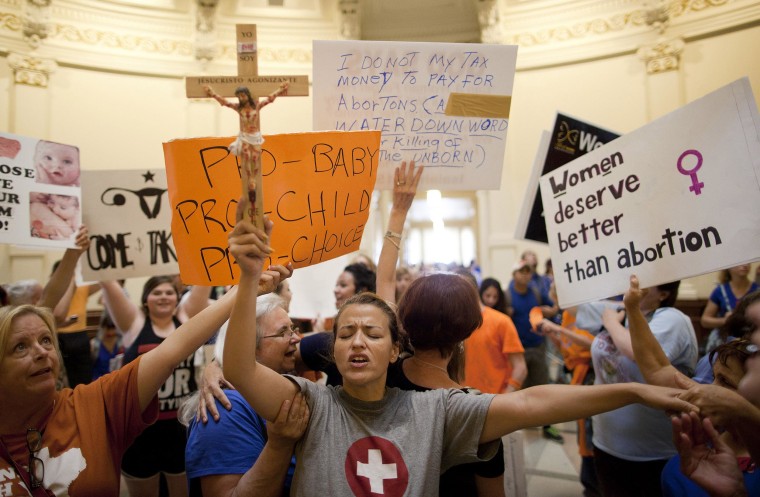The Supreme Court said last week it would take on the biggest challenge to abortion rights in a quarter century, agreeing to hear a challenge against a Texas law that put strict requirements on abortion providers in the name of protecting women's health.
The 2013 law requires abortion clinics to meet the same medical standards as standalone surgery centers, and forces doctors who provide abortions to have admitting privileges at nearby hospitals.
Conservative groups that approve of the laws say they'll protect women and prevent abuses like the case of Dr. Kermit Gosnell, a Philadelphia abortion provider sentenced to life in jail for first-degree murder whose clinic was described as a filthy house of horrors.
But medical groups have lined up behind the Center for Reproductive Rights, which is challenging the law, to say the requirements aren't necessary.
"Abortion is a very safe procedure, and complications requiring hospital admission are extremely rare," the American College of Obstetricians and Gynecologists (ACOG) and the American Medical Association (AMA) said in a joint amicus brief filed in a 2013 appeal against the law.
"There is no medical basis to require abortion providers to have local hospital-admitting privileges. Emergency room physicians, hospital-based physicians, and on-call specialists already provide prompt and effective treatment to all patients with urgent medical needs, including women with abortion-related complications," it added.
"There is no medical basis to require abortion providers to have local hospital admitting privileges."
"Moreover, there is no medically sound reason for Texas to impose more stringent requirements on abortion facilities than it does on other medical facilities that perform procedures with similar, or even greater, risks."
These include colonoscopies, laser eye surgery and vasectomies. Women can get very similar procedures to abortions, for instance when they're having a miscarriage, in a doctor's office in many states.
"When the leading medical groups like the AMA oppose these laws, you have to ask yourself what they are really about," said Jennifer Dalven of the American Civil Liberties Union.
"They're about shutting down clinics and attempting to prevent a woman who has decided to have an abortion from getting one."
"It's clear that some Texas politicians are attempting to make an end-run around women's legal right to an abortion by shutting down abortion facilities through the passage of laws that falsely claim to protect women," said Marcia Greenberger of the National Women's Law Center.
Texas state officials say the law is about health and safety.
"The advancement of the abortion industry's bottom line shouldn't take precedence over women's health, and we look forward to demonstrating the validity of these important health and safety requirements in court," said Texas Attorney General Ken Paxton.
Conservative groups agree.
"The Supreme Court now has the opportunity to confirm that states have a legitimate and compelling interest in better ensuring the safety and health of women who enter abortion clinics," said Sarah Torre and Elizabeth Slattery of the conservative Heritage Foundation.
"We've seen the dangerous and unsanitary conditions that abortion centers like Philadelphia abortionist Kermit Gosnell's 'house of horrors' clinic can create," they added.
"Until recently, abortion clinics were held to similar health regulations as beauty salons or public pools," the March for Life Education & Defense Fund said in a statement.
Supporters of the clinics note that when the laws were passed in 2013, there were more than 40 clinics in the state. Only 10 would remain if the laws are upheld, to serve 5.4 million women of reproductive age.
"Until recently, abortion clinics were held to similar health regulations as beauty salons or public pools."
"Texas paints a devastating picture of what's at stake for women across the country — where women are already traveling hundreds of miles, crossing state lines, and waiting weeks to get an abortion, if they can at all. A woman's very right to make personal medical decisions about abortion is now before the court," said Cecile Richards, President of Planned Parenthood Federation of America.
Planned Parenthood is fighting Texas on another front: the state has dropped the group from its Medicaid program. Planned Parenthood says that's an attempt to limit health care resources for women, too. The state says it's because of a series of activist videos that purported to show Planned Parenthood officials talking about illegally selling tissue from aborted fetuses. Planned Parenthood says the videos are heavily edited and denies it breaks any laws.
The National Latina Institute for Reproductive Health says the law unfairly targets Hispanic women.
"We are hopeful that when the Supreme Court reviews these deceptive and devastating laws, which fall hardest on Latinas and immigrant women, they will see what we already know. These laws have nothing to do with protecting women, and everything to do with creating coercive and nearly impossible-to-navigate hurdles for those who seek abortion," said Jessica González-Rojas, executive director of the organization.

